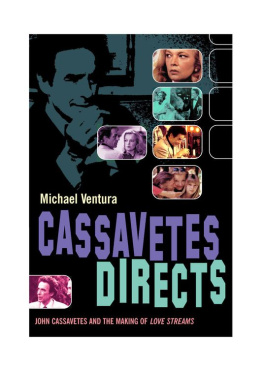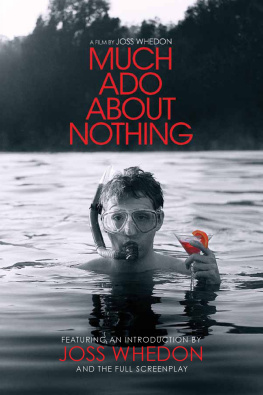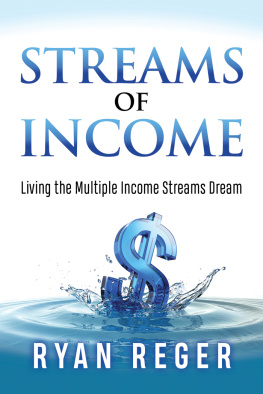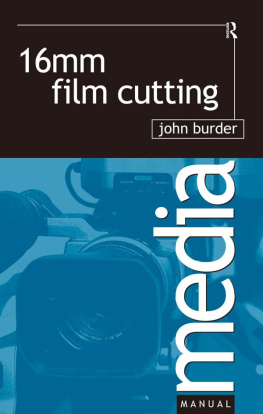For
John Ertha
who, when I was a boy, was the first in my experience to embodythe passion, courage, mind, and rascality that could be: a man.
You know I think that movies are a conspiracy they are actually a conspiracy, because they set you up, Florence, they set you up from the time youre a little kid. They set you up to believe in everything. They set you up to believe in ideals, and strength, and good guys, and romance, and, of course, love love, Florence. So you believe it, right? You go off and start looking. It doesnt happen. You keep looking. You get a job, like us, and you spend a lot of time fixing up things, your apartment and jazz, and you learn how to be feminine Theres no Charles Boyer in my life, Florence, you know? I never even met a Charles Boyer! I never met Clark Gable, I never met Humphrey Bogart, I never met any of them. You know who I mean. I mean, they dont exist, Florence, thats the truth. But the movies set you up, you know? They set you up. And no matter how bright you are, you believe it. And, Florence, you know that were bright? Florence, were geniuses compared to some of them! I mean, we go the movies and
Gena Rowlands as Minnie, in John Cassavetes Minnie and Moskowitz,
Art is a put-up-or-shut-up proposition.
Michael Berger
The only thing that remains constant is the love of what youre doing.
John Cassavetes
The Art of the Unpredictable
I think hes a genius. I always have. So said Steven Spielberg when I asked him about John Cassavetes.
The year was 1982. In two weeks Spielberg would premier E.T. Our interview had turned to the question of influences. Spielberg named Frank Capra, Michael Curtiz, and David Lean, influences whom anyone schooled in cinema would assume. But Spielbergs best films feature performances of tense immediacy, a realistic roughness-around-the-edges not associated with classic Hollywood. I was fishing when I asked about John Cassavetes, but Spielberg lit up at the name and told the kind of story many tell about John, a story of generous and unpredictable engagement.
Cassavetes is one of the first people I met in Hollywood, one of the first people who ever talked to me and gave me the time of day. He met me when I was sneaking around Universal Studios watching other people shoot TV shows. He was doing an episode of Chrysler Theater, that Robert Ellis Miller was directing, and he pulled me aside and said, What do you want to do? And I said, I want to be a director. He said, Okay, after every take you tell me what Im doing wrong, and you give me direction. So here I am, 18 years old, and theres a professional company at Universal Studios doing this TV episode, and after every take John walks past the other actors, walks past the director, he walks right up to me and says, What did you think? How can I improve it? What am I doing wrong? And I would say, Gah, its too embarrassing right here, Mr. Cassavetes! Mr. Cassavetes, dont ask me in front of everybody, cant we go around the corner and talk?
And he made me a production assistant on Faces for a couple of weeks, and I hung around and watched him shoot that movie, and John was much more interested in the story and the actors than he was in the camera. He loved his cast. He treated his cast like they had been part of his family for many years. And so I really got off on the right foot, learning how to deal with actors as I watched Cassavetes with his repertory company.
I said, Its funny about Cassavetes. When I first met him, you know hes short, but youre never aware of it, because of the way he holds his head, like hes looking down at you, like a tall guy. He tilts his head down, and his eyes burn up at you.
Spielberg laughed at my imitation. You got that, you got that. Its funny you mention that, because Ive always thought that one of the best ways of being a director was, as John did, scrounge around for the cast, promise them anything but give them quality, and look with great poignancy and attitude at your cast and crew up through your eyebrows, with your nose facing the ground. Thats something I learned from John.
As I write now, in 2006, 17 years after his death, Cassavetes is a hero of cinema, lionized as the founder of the independent film movement in America. Theres an Independent Spirit Award named after him, given annually for the best film made with a budget of under $500,000. Hes even been featured on a postage stamp. But when Spielberg told me that story in 1982, mainstream critics in print and academia were dismissive toward Cassavetes. If occasionally they liked his work they praised the performances more than the film, as though the picture was effective in spite of John. Hed had a hit in 1980 with Gloria, a studio-produced picture he later claimed to dislike. But his previous independent film, Opening Night (1978), now considered a masterpiece, received bad press and closed quickly. TheKilling of a Chinese Bookie (1976), disliked by audiences as well as critics, played briefly, and only in New York and Los Angeles. Nor did his last film, Love Streams (1984), find many friends in America. Cassavetes rarely admitted bitterness or disappointment, but in the early days of home-video I ventured to him that at least now his films could be issued on tape. He glared, shook his head no: If they didnt come to see us in theaters, fuck em.
That was then. Now Cassavetes is revered. His family has released on DVD the five films he produced, which include his finest save for Husbands and Love Streams. His pictures disquiet audiences as much as ever, but many recognize that Cassavetes techniques have become central to the vocabulary of contemporary cinema.
John Cassavetes released his first film, Shadows, in 1959. In films prior to that year, nothing resembles the camerawork and scenic pacing of Shadows. Its last frames announced, The Film You Have Just Seen Was An Improvisation. American critics missed the point, assuming that improvisation was a loose, anything-goes process. But for Cassavetes the word improvisation meant what it means in jazz: a carefully structured but freely performed whole. Misunderstanding this, American critics did not credit John with intent. But Cassavetes next major work, Faces (1968), was scripted (his screenplay even won an Academy Award nomination). Faces made clear that Johns camerawork, dialogue, and performances were precisely what he intended.
His intentions were as unique as the techniques he created for their expression. Ingmar Bergmans people may or may not make peace with God, or the Void, or whatever; Fellinis may or may not make peace with themselves; and the characters of John Ford, Howard Hawks, and Steven Spielberg relate to themselves as part of a story that is larger than themselves. But Cassavetes people must make, or fail to make, peace with each other. There is no larger story. There are only common people facing each other in rooms as common as any. He tolerated no other terms. Two people, able or unable to look into each others eyes that was his ultimate test for all codes, manners, morals, politics, psychologies, and beliefs. To give that test its due, he reshaped the vocabulary of film.
John Cassavetes work is the art of the unpredictable, because he felt that in life one never knows what will happen next. His is the art of the edgy and unresolved; in daily life he saw no resolutions or solutions and no certainty that would not be tested by tomorrows uncertainty. He invented a cinematic form in which this vision could be both expressed and embodied. Cassavetes is an art of crowded close-ups and irregular pacing. His is a dialogue of sentence-fragments, commonplaces, outbursts, reveries, and overlapped lines, punctuated with silences moments when one character looks at another in a naked plea for acceptance, without understanding as a condition. In cinematography, John Cassavetes does away with the







